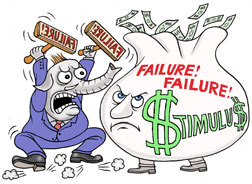Conservatives claim the stimulus has already failed. But it has barely started.
 From the moment it passed, the $787 billion American Recovery and Reinvestment Act—the stimulus bill—has been the subject of controversy. Many critics have deemed it a debacle, since unemployment has continued to rise in the months since its passage. The Republican Party declared the bill a failure over the summer, and House Minority Leader John Boehner recently deemed it a waste: "You can't spend $800 billion of taxpayer money and not create jobs when you say that's what the goal was." At a dinner several weeks ago, I heard a cable news reporter, one whose job is to report numbers accurately, declare that "we've already spent $800 billion and it was a waste." I suppose it's too much to ask political hacks and TV reporters to get the size and timing of the stimulus package right. But I expect better from my colleagues at the Washington Post editorial page, which on Sunday argued against further stimulus measures because they would add to the scary national debt and because "the government still hasn't run through half of the $787 billion in tax cuts and spending increases enacted this year."
From the moment it passed, the $787 billion American Recovery and Reinvestment Act—the stimulus bill—has been the subject of controversy. Many critics have deemed it a debacle, since unemployment has continued to rise in the months since its passage. The Republican Party declared the bill a failure over the summer, and House Minority Leader John Boehner recently deemed it a waste: "You can't spend $800 billion of taxpayer money and not create jobs when you say that's what the goal was." At a dinner several weeks ago, I heard a cable news reporter, one whose job is to report numbers accurately, declare that "we've already spent $800 billion and it was a waste." I suppose it's too much to ask political hacks and TV reporters to get the size and timing of the stimulus package right. But I expect better from my colleagues at the Washington Post editorial page, which on Sunday argued against further stimulus measures because they would add to the scary national debt and because "the government still hasn't run through half of the $787 billion in tax cuts and spending increases enacted this year."
Some things about the stimulus are indeed complicated. How precisely do you measure the number of jobs "saved" when the federal government cuts checks to states, thus allowing them to avoid budget cuts? But some things about the stimulus are quite simple, including its size and the amount of it that has been spent so far.
To begin with, the stimulus was $787 billion, not $800 billion. (Those of you who think there isn't much of a difference, please make out a check for the difference to Daniel M. Gross.) The more egregious error has to do with the timing. Many critics act as if the entire amount has already been spent. They're completely wrong. Even to argue that it's been half-spent, as the Post, does, is only half-right.
As was planned from the start, in fact, only a small portion of the $787 billion has been spent. The Council of Economic Advisers recently issued a comprehensive report on the impact of the stimulus. "As of the end of August, $151.4 billion of the original $787 billion has been outlaid or has gone to American taxpayers and businesses in the form of tax reductions," the CEA reports. That's 19 percent. If projections made for September expenditures are right, "between one-fifth and one-quarter of the total $787 billion" was spent by the beginning of October.
This is not surprising. The ARRA is divided into six different types of components, from tax cuts to infrastructure investments. Some can be done quickly (cutting and mailing tax rebate checks) while others (building bridges) take longer. "The areas where stimulus has been largest in the first six months are individual tax cuts, state fiscal relief, and aid to those most directly hurt by the recession," the CEA reported. Through the end of August, in fact, tax cuts accounted for $62.6 billion of expenditures, and government investment outlays accounted for only $16.5 billion.
In other words, nearly eight months after its passage, a large majority of the stimulus has yet to start impacting the economy—as was the plan.









No comments:
Post a Comment